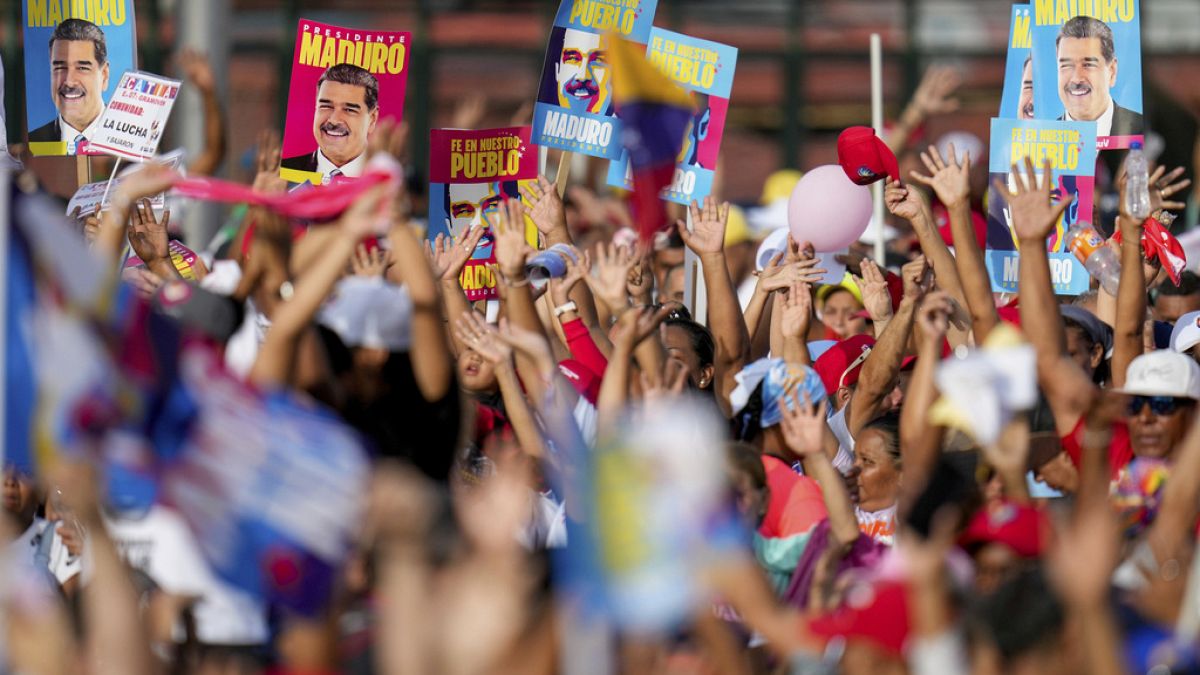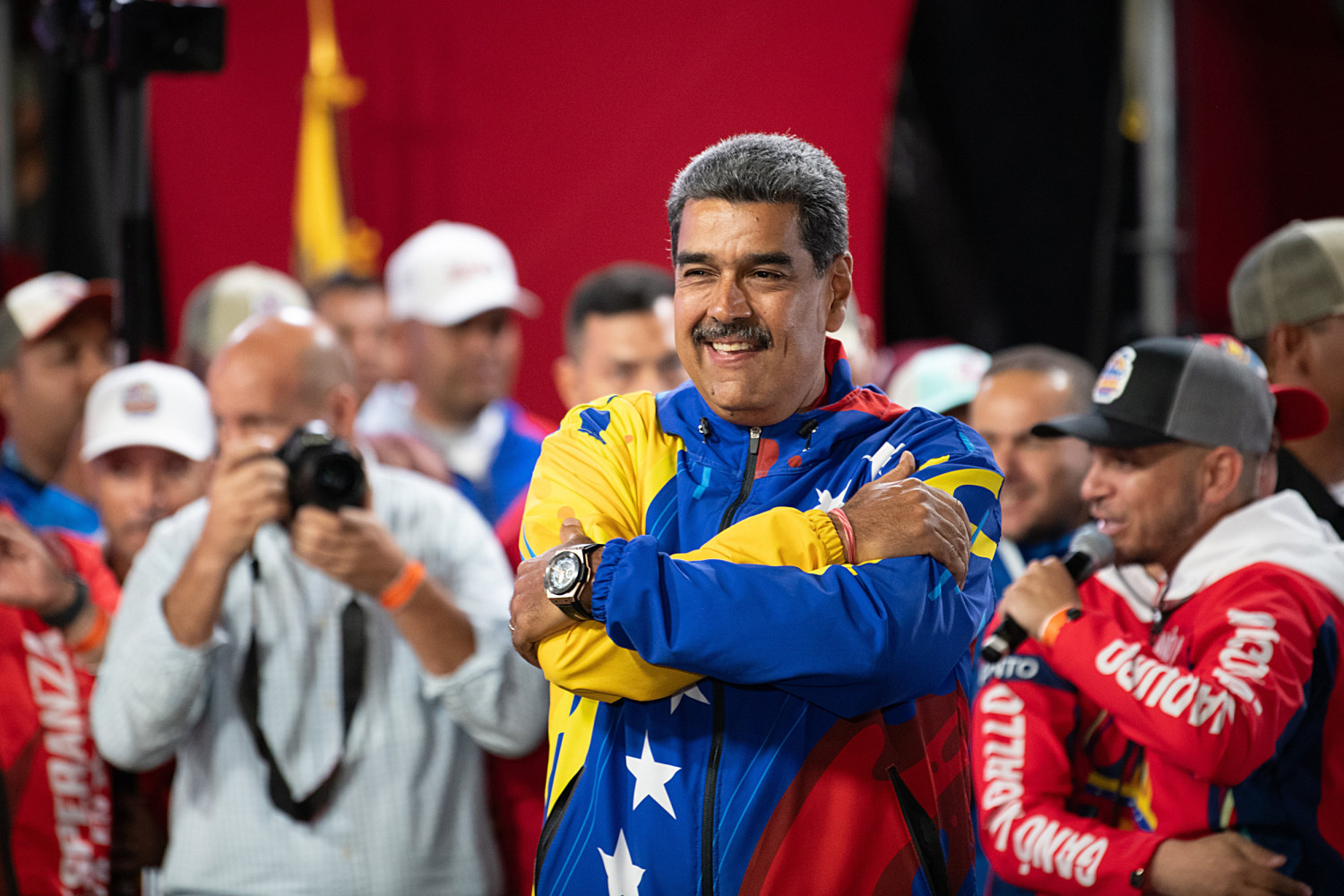As the Venezuelan political climate continues to escalate, President Nicolás Maduro has issued threats in response to the deadly protests sparked by the disputed election results. Demonstrators, who oppose Maduro’s administration, have taken to the streets en masse, expressing their anger and dissatisfaction over a vote that they believe was rigged in favor of the incumbent president.
The protests have unfortunately resulted in fatalities, further deepening the crisis in the South American nation. As a response to this civil unrest, Maduro has adopted an aggressive stance, issuing threats against those involved in the protests. The severity of his warnings raises concerns about potential escalation of violence and further suppression of dissenting voices. Critics of Maduro’s regime believe that his words are meant to intimidate and silence the opposition, while supporters argue that such measures are necessary to maintain order in the face of civil disobedience.
This situation is a stark reminder of the volatile political landscape in Venezuela, a country grappling with economic turmoil, widespread poverty, and increasing international isolation. The international community watches with growing concern as the stand-off between the Venezuelan government and the opposition continues, with no clear resolution in sight.

Escalation in Venezuela: Maduro’s Reprisals and Their Potential Impact
The escalation in Venezuela under Maduro’s rule presents a myriad of challenges, both internally and globally. Maduro’s reprisals, particularly against his political opponents, continue to exacerbate the already fragile socio-political landscape of the country. These actions not only stifle opposition voices, but also generate fear, creating an environment that inhibits the free expression of ideas and democratic discourse.
Internationally, these reprisals have potential implications for the stability of the Latin American region and raise concerns about human rights violations. The potential impact of Maduro’s actions is multifaceted. On an economic level, they could lead to further isolation of Venezuela, as nations may be reluctant to engage in trade with a country experiencing such high levels of political volatility. This could deepen the current economic crisis and intensify the hardship faced by the Venezuelan people.
On a political level, the reprisals could provoke further civil unrest, potentially leading to yet another wave of mass emigration, as citizens seek refuge from the repressive regime. Moreover, the situation could have ripple effects beyond Venezuela’s borders, with neighboring countries potentially being affected by the influx of refugees. Therefore, the global community must continue to monitor the situation in Venezuela closely, and consider measures that could help mitigate the impact of Maduro’s reprisals.
What Sparked the Venezuelan Protests and How They Turned Deadly
The Venezuelan protests that started in 2014 were primarily triggered by deep-seated economic and political crises. The nation, once rich in oil reserves, was grappling with rampant inflation, severe shortages of basic necessities such as food and medicine, and an acute economic downturn.
This dire situation was aggravated by extensive corruption, political mismanagement, and a lack of transparency within the government. The protests began as peaceful demonstrations by citizens demanding improved living conditions and government accountability. However, they soon escalated into a serious confrontation between the government and the opposition, leading to a significant number of fatalities.
Under the leadership of President Nicolás Maduro, the Venezuelan government was increasingly perceived as an authoritarian regime. The opposition, led by Juan Guaidó, accused Maduro’s administration of dismantling democratic institutions, suppressing political dissent, and violating human rights. As the tension mounted, the government responded with increased force to quell the protests, deploying state security forces and armed groups known as “colectivos” to repress the demonstrators.
These confrontations between the protesters and the security forces turned the initially peaceful protests into a deadly conflict. The excessive use of force by the government, including the indiscriminate use of tear gas, rubber bullets, and even lethal ammunition, resulted in numerous injuries and deaths among the protesters. Furthermore, arbitrary arrests and allegations of torture escalated the human rights crisis.
The international community, including the United Nations and human rights organizations, expressed deep concern over the situation. They condemned the Venezuelan government’s violent crackdown on the protests and called for an immediate halt to the violence. Despite these appeals, however, the situation in Venezuela has continued to deteriorate, with the protests reflecting the deepening despair of a population struggling to survive amidst political turmoil and economic collapse.

Analyzing Maduro’s Threats: What They Mean for Venezuela’s Political Climate
Analyzing the threats of Nicolás Maduro, the current President of Venezuela, offers a revealing insight into the political climate of the country. Maduro’s administration has been marked with controversy and conflict, with his threats and actions often resulting in a tense and unstable environment.
One of the main issues is his refusal to give up power, despite widespread opposition and calls for new leadership. His threats to use force and violence to maintain control have led to a significant increase in tensions and uncertainty in the country. This persistence in clinging onto power, even in the face of widespread dissent, serves to further deepen the political divide in Venezuela. Furthermore, the use of fear and intimidation tactics by Maduro’s government against opposition groups and critics reveals an alarming disregard for democratic principles such as freedom of expression and political participation.
The government’s routine use of such tactics has contributed to a climate of fear and repression, stifling any form of dissent or criticism. Moreover, Maduro’s apparent willingness to engage in corrupt practices to maintain his grip on power has further eroded the country’s political stability and integrity.
This blatant disregard for ethical standards is not only damaging the reputation of Venezuela on the international stage but also exacerbating domestic issues such as economic instability and social unrest. The threats and actions of Maduro’s administration, therefore, serve as a stark indication of the dire state of Venezuela’s political climate, marked by an erosion of democratic values, political polarization, and a rampant culture of fear and repression.
The Role of International Community in the Venezuelan Crisis
The Venezuelan crisis, marked by severe economic decline, social unrest, and political instability, has required significant intervention from the international community. This crisis has led to a surge in migration, with millions of Venezuelans seeking refuge in neighboring countries, escalating the need for international aid and diplomacy. The international community has played a pivotal role in providing humanitarian assistance, with numerous countries and international organizations offering food, medical supplies, and financial support to alleviate the suffering of the Venezuelan people.
On a diplomatic front, the international community has been instrumental in mediating political dialogues and negotiations. International powers like the United Nations, European Union, and the Organization of American States have been actively involved in fostering communication between the Venezuelan government and the opposition, aiming to find a peaceful resolution to the political stalemate.
Moreover, the international community has exerted pressure on the Venezuelan government to respect human rights and democratic principles. Sanctions have been imposed by several countries and international bodies in an effort to influence the governance style of the Maduro regime. These economic and political sanctions are a tool used to express disapproval of the government’s actions and to encourage democratic reforms.
However, the international community’s role in the Venezuelan crisis has not been without controversy. Critics argue that foreign intervention often exacerbates the situation, fuelling political tensions and undermining the sovereignty of the Venezuelan state. Furthermore, the efficacy of sanctions has been questioned, as they often bear the brunt on the country’s civilians rather than the intended political elites.
In conclusion, while the international community has played a vital role in addressing the Venezuelan crisis, its interventions have been a topic of heated debate. Yet, the continued involvement of international actors is undeniable in the pursuit of a peaceful, democratic, and prosperous future for Venezuela.

Understanding the Background: Key Events Leading Up to the Venezuelan Crisis
Understanding the background and key events that led to the Venezuelan crisis provides crucial insight into the country’s current predicament. A series of political, social, and economic factors have gradually escalated over time, leading to the present situation. Venezuela’s prosperity was largely built on its oil wealth, with the country having one of the world’s largest oil reserves. When international oil prices were high, the government, under the leadership of Hugo Chávez, introduced a series of social programs that improved living standards for many Venezuelans. However, this reliance on oil as a primary source of income made the country vulnerable to fluctuations in oil prices.
When oil prices plummeted in 2014, the Venezuelan economy was severely affected. The government, rather than diversifying its economy, had relied heavily upon oil revenues to finance social spending, and this sudden drop in income led to a significant funding gap. This situation was compounded by mismanagement and corruption within the state-run oil company, PDVSA, which further diminished the government’s revenue stream. Inflation began to rise, causing a decrease in the purchasing power of the average Venezuelan citizen and leading to widespread shortages of basic goods, from food to medicine.
The political landscape also contributed to the crisis. Hugo Chávez’s successor, Nicolás Maduro, faced significant opposition and criticism for his handling of the economic crisis and allegations of electoral fraud. This led to mass protests and civil unrest across the country, further destabilizing the nation. Maduro’s government responded with increasingly authoritarian measures, including the dissolution of the opposition-led National Assembly and the establishment of the controversial Constituent Assembly. These actions isolated Venezuela internationally, with several countries imposing sanctions that further exacerbated the country’s economic issues. Understanding this sequence of events is crucial to fully comprehend the depth and complexity of the crisis that continues to plague Venezuela.